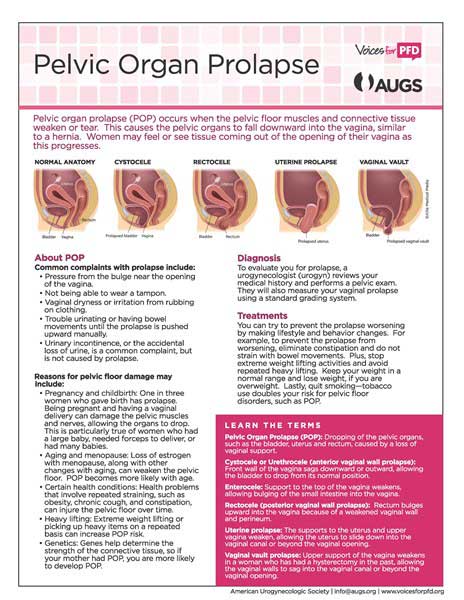
“Urogenital prolapse occurs when there is weakness in the supporting structures of the pelvic floor allowing the pelvic viscera to descend and ultimately fall through the anatomical defect.”
– Bo, Kari, Berghmans, Bary, Morkved, Siv, Van Kampen, Marijke, Evidence-Based Physical Therapy for the Pelvic Floor, Elsevier Ltd., 2007.
There are five main types of pelvic organ prolapse (sometimes referred to as urogenital prolapse) that we see:
- Urethrocele: prolapse of the lower anterior wall involving the urethra.
- Cystocele: prolapse of the upper anterior vaginal wall involving the bladder.
- Uterovaginal prolapse: prolapse of the uterus, cervix and upper vagina.
- Enterocele: prolapse of the upper posterior wall of the vagina usually containing the small bowel.
- Rectocele: prolapse of the lower posterior wall of the vagina involving the anterior wall of the rectum.
Treatments for pelvic organ prolapse that we offer in our office include:
- Pessary Fittings: Pessaries are supportive devices that help reduce the discomfort and/or incontinence that often accompanies pelvic organ prolapse
- Strength Training: identifying your weaknesses during our initial visit and developing a specific strength program to address them
- Functional Training: this includes advancing strength and coordination issues that were identified at your initial visit, and incorporating these movements into your daily activities
- Manual Therapy: Not all muscles need to be strengthened right away, even when there are apparent weaknesses. Our physical therapists will determine if there are any short or tight muscles that are affecting your ability to fully contract and strengthen your pelvic floor, and the surrounding muscles that help support their function
- Biofeedback: this modality can be helpful for patients that have a difficult time ‘locating’ their pelvic floor. A biofeedback machine gives you visual input in ‘real-time’ on the performance of your pelvic floor muscle contractions, relaxation and overall coordination.
- Electrical Stimulation: Sometimes your muscles need a boost, and using electrical stimulation as a painfree modality to help you further ‘locate’ and strengthen your pelvic floor muscles.
